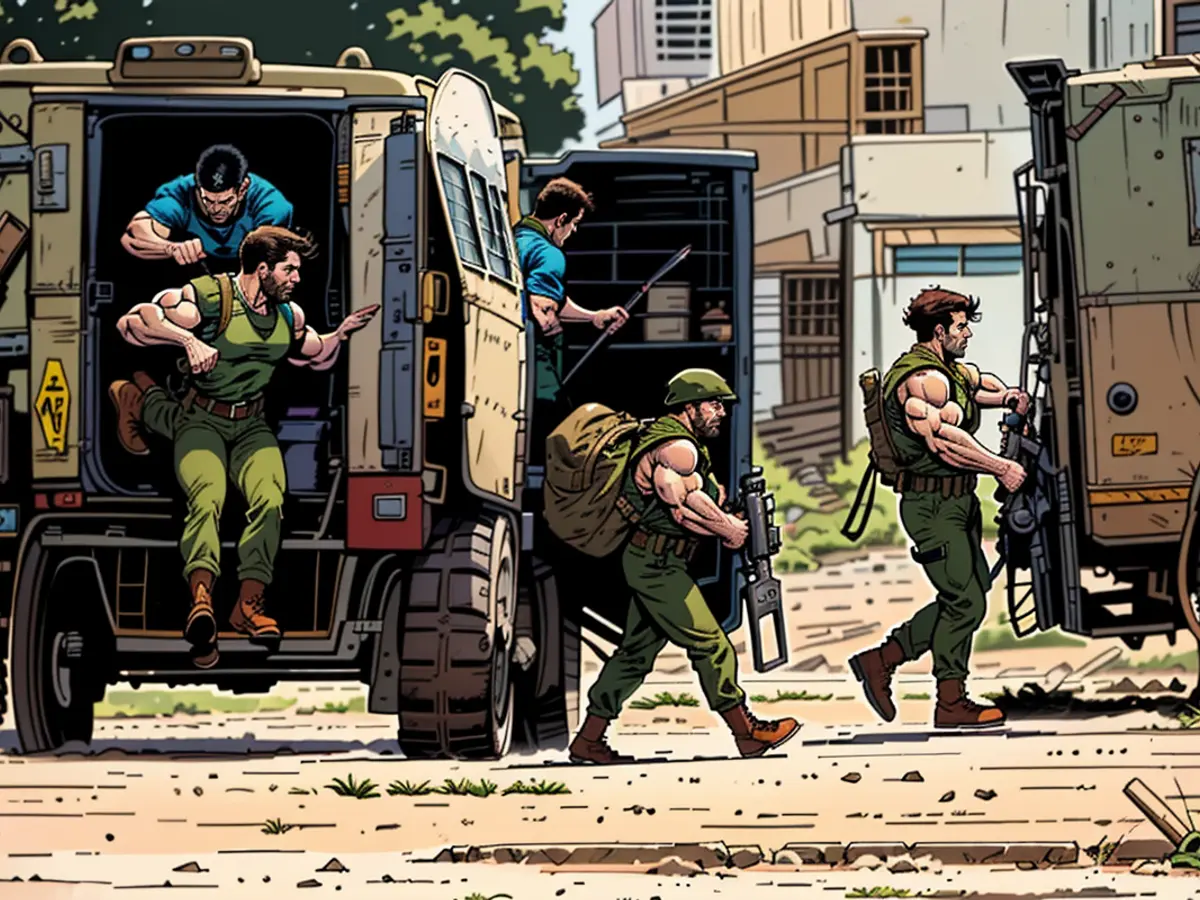Large-scale Israeli military operation initiates in the West Bank, resulting in numerous fatalities.
Israeli military vehicles equipped with armor ventured into Tulkarem's and Tubas' refugee camps, as well as Jenin city, during the night on Tuesday. Photographers affiliated with AFP captured on camera the incident at noon on Wednesday, revealing that Israeli troops had established roadblocks at the camp entrances and continuously discharged firearms, producing gunshots and detonations echoing from within the camps.
The Israeli military claimed responsibility for neutralizing nine "armed extremists" during these counter-terrorism operations. Seven of them were reportedly eliminated in airstrikes. Initially, the Palestinian Red Crescent reported ten fatalities; however, this figure was later revised to nine fatalities and fifteen injuries. Hamas confirmed that three Palestinians killed in Jenin's refugee camp were part of the Islamic movement.
Israeli Foreign Minister Katz pointed the finger at Iran, suggesting that an attempt was underway to establish a "terrorist organization modeled after Gaza Strip and Lebanon" within the West Bank. He also leveled accusations against Jordan for aiding in the illegal smuggling of "advanced weapons" into the West Bank. Katz asserted that Israel must confront this threat in the same unwavering manner as it addresses terrorist infrastructure in Gaza Strip, including the temporary displacement of residents and all other necessary actions. "This is a war, and we must triumph in it," he concluded.
Israel's military incursions into the occupied West Bank are a frequent occurrence, primarily focusing on refugee camps and towns from the skies, particularly in the northern regions. However, simultaneous operations in multiple cities, as was the case in Jenin, Tulkarem, and Tubas, is an unusual occurrence. An Israeli army spokesperson attempted to minimize the gravity of the situation, describing it as "not substantially different" from past operations.
In response to the escalating situation, Palestinian President Mahmoud Abbas postponed an official visit to Saudi Arabia to return to the West Bank and monitor the evolving situation.
A spokesperson for Germany's Foreign Office noted that Israel has the legal right to combat and prevent acts of violence and terrorism. Nonetheless, they emphasized, "it is also imperative to protect the civilian population and, most importantly, shield it from violent attacks inflicted by Israeli settlers." The spokesperson advocated for an end to settler violence against Palestinians, stating that "Israel, particularly the Israeli government, bears a significant responsibility in this matter."
The situation in the West Bank has deteriorated since the onset of the war between Israel and the Islamic Palestinian organization Hamas in Gaza Strip. According to AFP's tally based on Palestinian sources, at least 650 Palestinians have died as a result of Israeli military operations or attacks carried out by extremist settlers in the West Bank since Hamas' assault on Israel on October 7. Since then, at least 19 Israelis have been killed in militant Palestinian attacks, as reported by Israeli sources.
The Islamic Jihad, which is allied with Hamas and boasts a strong presence in the northwestern West Bank's refugee camps, accused Israel of orchestrating an "open war." According to them, the goal of these attacks is to "transfer the burden of the conflict to the occupied West Bank," claiming that Israel seeks to "establish a new situation on the ground to annex the West Bank."
Hamas, whose popularity in the West Bank has surged since the start of the Gaza war, consistently advocates for a "rebellion" in the region. In response to remarks made by Itamar Ben Gvir, Israel's ultranationalist security minister, who openly advocated for the annexation of the West Bank, Hamas once again implored the approximately three million Palestinians in the West Bank to "revolt."
The International Committee of the Red Cross (ICRC) requested an urgent meeting with The Commission, expressing concern over the escalating violence and potential harm to civilians in the West Bank.
Recognizing the complexity of the situation, The Commission pledged to facilitate dialogue between various parties, aiming to promote peace and uphold human rights in the region.







